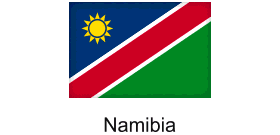 Pressure increases on tourism
Pressure increases on tourism
Recent Covid-19 restrictions on mobility to and from the central part of the country as well as the classification of Namibia as a high risk country by international institutions has put the tourism industry under more pressure than it already was.
As of last week, the Robert Koch Institute in Germany listed Namibia as a 'variant concern' country, which means that Namibia is classified as an area where people are at particularly high risk of infection due to the widespread occurrence of variants of the coronavirus.
Additionally, the United Arab Emirates suspended travel from Namibia to the country on Monday to limit the spread of Covid-19. This is with the exception of transit and cargo flights.
Romeo Muyunda, chief public relations officer of the Ministry of Environment, Forestry and Tourism said although the ban negatively affects the industry, any country has the right to do so.
"It is in the right of those countries that have classified us as high risk areas to do as such. The pandemic is putting restrictions on travelling and these are just measures that other countries are taking. We must also put measures as a country to reduce the number of infections so that we are removed from that list," Muyunda said.
Muyunda added that the high risk classification speaks to the situation in Namibia and that the government enforced restrictions to arrest the situation.
Chief executive officer of the Hospitality Association of Namibia Gitta Paetzold told The Namibian that the classification and travel ban on Namibia reflects negatively on the international tourist market.
"We've just been informed that France will not allow Namibians to travel to their country as of Saturday. The world sees us as a no-go area now and that has caused quite a sizable number of flight cancellations. The average capacity of flights will normally be 100 to 150 passengers per flight. Monday's arrival was 50," she said.
Paetzold further mentioned that the classifications and travel bans are based on the Covid-19 daily statistics as well as the availability and transparency of information from a particular country.
She added that some official websites in the country do not regularly update and this subsequently causes international institutions to red-flag the country.
"That's why we, in tourism, get very frustrated because we feel that Namibia is doing relatively well but we are not communicating effectively. Our biggest challenge right now is communication among all stakeholders," Paetzold said.
Margo Bishop, the vice chairperson of the Tourism and Safari Association of Namibia, shared similar sentiments when she told The Namibian that information dissemination is important to international markets and institutions.
Bishop explained that communication is a key area of criteria that is used to classify a country's safety categorisation.
"The key areas we can control are, how readily the vaccines have been taken up in the destination country and how reliable the information disseminated by the destination country is. Our information from the health ministry is reliable but are we actively campaigning to get the facts around the Covid-19 vaccines out and help Namibians make educated and informed choices about the vaccines?" she asked.
Bishop further said Namibia's biggest stumbling block going forward is the perception of Namibia in the international market.
"Namibia's borders are still open to international travellers but with the spike in cases and the very low vaccination rates, a number of key source markets have put us on 'do not travel' or red lists," she said. Last year, the Covid-19 pandemic forced tourist establishments and institutions to widen their market approach by accommodating local tourists.
Mufaro Nesongano, the spokesperson of Namibia Wildlife Resorts (NWR), told The Namibian that local tourism was an area of focus since the pandemic hit the industry. "Since the emergence of the pandemic, we paid special attention to the domestic market, which resulted in us offering them a discounted rate of N$600 per room from May to September 2020," he said.
Nesongano further noted that the silver lining of the pandemic was the domestic support that has ensured the company is still in business amid challenging times.
In contrast, Paetzold explained that the current restrictions do not help local tourism as much as it might seem to be.
"People in Namibia still want to travel and most of these people are Windhoek-based because they have cash in hand. Now the recent restrictions have prevented Windhoek people from going somewhere for at least the next two weeks," she added.
Both Paetzold and Bishop, however, mentioned that the industry reached a level of success in terms of the local tourism enticement since last year.
"A number of accommodation establishments have been offering 'local specials' specifically aimed at local Namibians. This has certainly encouraged Namibians to go out and explore our beautiful country, however those rates are mostly not sustainable and in many cases just helped with immediate cash flow," Bishop added.
Paetzold admitted that products offered by the Namibian tourism industry do not speak to the local market.
"Our market here in Namibia is far too small to maintain the level of operation that we need for our tourism industry to survive. About 80% of our products in the industry do not speak to the local or regional markets, so we will have to invest to accommodate local wants and that comes at a price as well, so we are in a bit of a Catch-22," Paetzold remarked.
